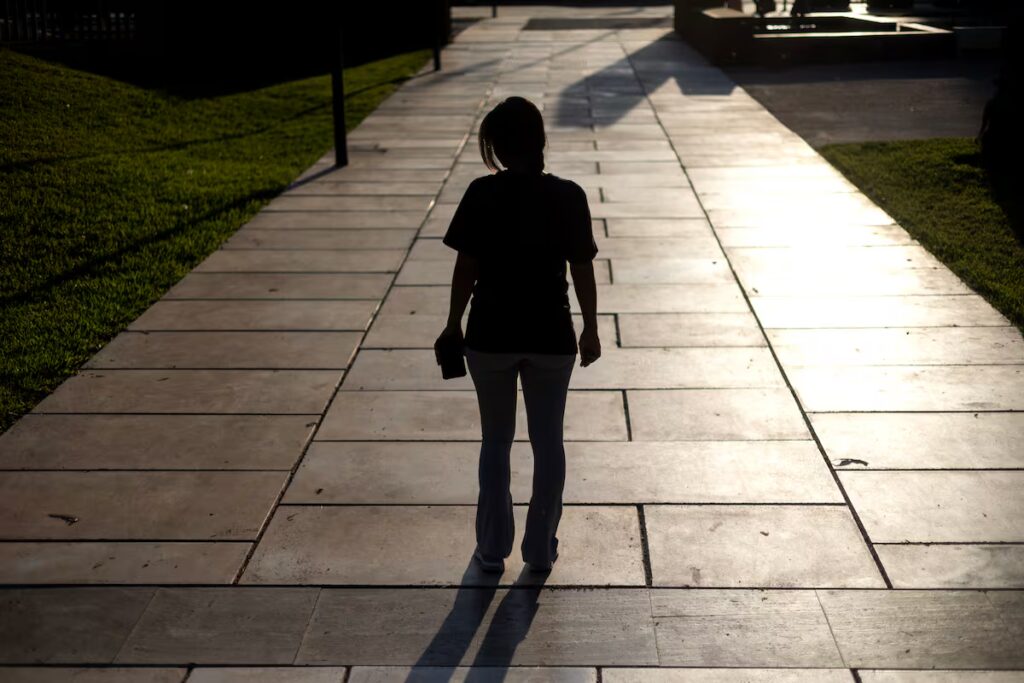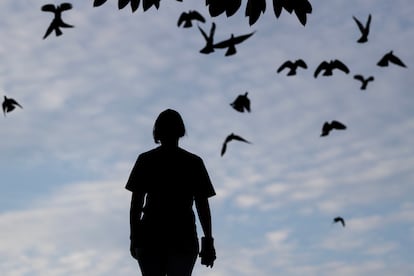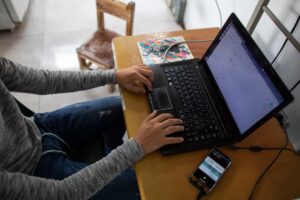
Last June, Alberto took the anti-abuse bracelet off his wrist and left it, as payment, in a bar in Torremolinos, a town in Malaga with almost 71,000 inhabitants. He left it on the counter next to the phone that geolocates him at all times and then it disappeared. The National Police found him only four days later. It was a nightmare 96 hours for Luisa, who repeatedly insulted, harassed and beat her during their two-year relationship, according to a ruling from Malaga’s Court Number 1 for Violence against Women, which imposed a restraining order and 26 months in prison. “It was like going back to hell. It’s really scary to be able to do something like that,” he says.
At that point, this woman was already living in constant alert because the device had failed repeatedly since she received it nearly a year earlier. “Some days I found it and the alarm didn’t go off. Plus, they changed my terminal up to 14 times in just over a year because it wasn’t working well,” he says. “I don’t trust the device at all, only the police officers who take care of me,” he adds regarding some bracelets which, according to the latest report from the State Attorney General’s Office, have had problems for more than a year and for which, for the moment, there has been no assumption of responsibility. All in all, it is one of the most guaranteed protection systems that exist in Spain. No woman has ever been killed while wearing one of these devices. Even if sometimes, like last November 11th, the system fails.
Luisa is not called Luisa – and Alberto is not called Alberto -. Her name has been changed to protect the identity of a woman who dared to talk about her situation “so that the same thing doesn’t happen to others.” It’s an example of how anti-abuse bracelets and their malfunctions, such as GPS jumps or loss of coverage, can become an ordeal for the 4,730 women who currently wear these devices. The Ministry of Equal Opportunities has been aware of these shortcomings for months, through reports from the Cometa centre’s technicians, and has now returned to the center of the political debate. And for this particular victim, as for many others, the consequences are multiple.
The woman explains that this meant changing jobs and moving her children to another school to try to make it more difficult for her ex-partner to find her. But it also led her to lose faith in a system that sometimes repeatedly failed for no reason or that, at times, left her in the dark, abandoned. “Do you know what it’s like to be in the car, see the guy driving by in the opposite direction and hear the alarm go off just two minutes later? How safe is that?” he asks. “I wish there was a device that works 100% securely,” he adds, speaking of the devices that Vodafone and Securitas will operate from spring 2024.
The first martyrdom that Luisa survived was that of her relationship. Her previous partner, with whom she had two children, left home and abandoned them completely. Alone, vulnerable, she met someone. A relationship has begun. It was February 2020 and a month later the pandemic arrived. “He told me that we should move in together in isolation. Then I could work and he could take care of my children. Finally he convinced me,” she recalls.
Soon the screaming, the lying, the beatings began. To her and her children. Jealousy was almost always the reason. She lived in fear until, seven months pregnant, she was beaten. It was Christmas Day 2021. And it was the last one because he managed to escape. He never looked back.
Then came threats of death or to burn the car. At the same time, one morning he found the vehicle’s window broken and the car seat burned. He understood that Alberto could do what he said. He went to report the incident to the National Police. At the police station he felt safe. And when they asked her if he had hit or molested her, she said yes.
Officers then established that he had up to 17 arrests – from road safety offenses to threats or sexual assault – and that he had a pending prison sentence for a crime of family violence against a previous partner. They summoned him, he showed up and went to prison. “It was a truce,” says Luisa.
The court issued a precautionary restraining order against the man, which was not necessary as he was in prison. Until he came out in August 2024. It took 24 hours to put the bracelet on him and that day seemed eternal for his ex-partner. “I didn’t leave the house, the children didn’t go to school, I was very scared,” he says. But there the second martyrdom began. The device gave new power to the attacker. He discovered that with it he could alter women permanently.
On many days the alarm sounded up to 10 times in a short time, because he approached the car within 500 meters of his house for a few seconds and then drove away, before approaching again and driving off again. “Other times he left the cell phone that geolocates him at home or had turned it off. Always without consequences for him. He did it to torture me”, he highlights.

“And the worst thing is when the system doesn’t work. One day I saw him at the pedestrian crossing and he was approaching my car. The alarm went off, but at Cometa they told me he was more than 30 meters away and I saw that I had him on top of me. Luckily the traffic light turned green and I managed to escape”, he adds. On other occasions the system would fail for no reason. Or he did it so many times in a row that Luisa almost stopped paying attention so as not to live in constant stress.
From the moment he filed the complaint until the trial took place, more than two years passed. In January 2025, the number 1 court against violence against women in Malaga sentenced the man to 26 months in prison, a suspended sentence – provided he had not committed another crime, had not broken the restraining order and paid the civil liability – after an agreement reached because the victim did not want to suffer the trauma of testifying and having him near him in the courtroom again. “I just needed him to be as far away from me as possible,” she says.
He got that restraining order to move 500 meters away from her, her home and her business for eight years. But he has started leaving the phone that tracks him at home or unplugging it. And the failures when they crossed paths continued. Until June, as shown by an act of the criminal court number 14 of Malaga, he paid at the Torremolinos bar with his bracelet and his mobile phone (the devices were then collected by the technicians of the Cometa centre). “The bracelet meant new power for him. It is another form of remote abuse,” says lawyer Lara Tur, who is handling the case and asked for the suspension of the sentence to be revoked because the convict did not comply with the conditions, including violating the restraining order.
Luisa could only breathe when, a month after that incident, the police officer in charge of her protection told her that Alberto had ended up in prison for another crime. “Now that he is in prison, I am free. Sooner or later he will be able to come out again. Then he will be free, but I will live locked up and in fear”, complains the woman, who now when she changes jobs the first thing she does is find out the emergency exits, the location of the security cameras or any hiding places. “We have the problem of not living and worrying, when they should be the ones having difficulties,” he concludes.
The 016 telephone line assists victims of sexist violence, their families and those around them 24 hours a day, every day of the year, in 53 different languages. The number is not recorded on the phone bill, but the call must be canceled from the device. You can also contact via email 016-online@igualdad.gob.es and via WhatsApp on 600 000 016. Minors can contact the ANAR Foundation telephone number 900 20 20 10. In case of emergency it is possible to call 112 or the telephone numbers of the State Police (091) and the Civil Guard (062). And if you can’t call you can use the ALERTCOPS application, from which an alert signal is sent to the Police with geolocation.





